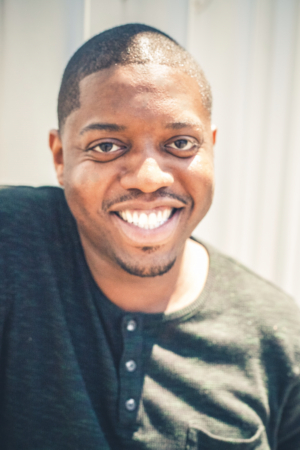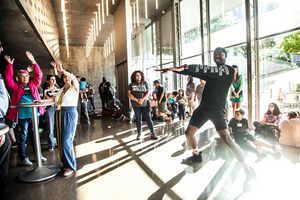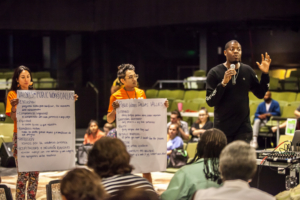Interview: Dayron Miles of AS YOU LIKE IT at Dallas Theater Center

We've all been to shows where either the actors onstage or the audience don't look a whole lot like the people who actually live in that city. That's where Dayron Miles at Public Works- Dallas comes in. Public Works doesn't just invite people in the community to come watch a show, they invite them to be part of the creation process. I learned so much about Dayron's collaboration with Dallas Theater Center and their creative approach to fostering inclusivity in theater when I sat down to talk with him earlier this week
Tell us a little about the collaboration between Public Works-Dallas and Dallas Theater Center.
Public Works Dallas is the Dallas Theater Center's mission alive and onstage. We have a year-round program where we work with five community programs, where we have artists go out and lead our community partners in weekly workshops. Those workshops are free for our participants, and they all culminate in this 200 person musical adaptation of a classic, which for this year is As You Like It by William Shakespeare. The truth is we are putting our community at the heart of the Dallas Theater Center, and hopefully putting the Dallas Theater Center at the heart of the community. We are deliberately blurring lines of who we think of as an artist. It's our belief that creativity is the birthright of every human being. The impulse to create is just as natural as the impulse to breathe. And so, by inviting as many folks in our community into that space, we are hopefully reestablishing norms. I often talk about how western theater was invented at the exact same time as democracy. We believe that in order for theater to truly happen, our audience and the artists onstage should be republican as an act of democracy. It should truly reflect every part of our community, and if it doesn't, then we're not really achieving that goal.
 200 Actors. How does that work- do you have different actors for each performance?
200 Actors. How does that work- do you have different actors for each performance?
No! 100 members of the ensemble come from those weekly workshops. The auditions at the end of our workshop cycle get us 100 folks, so 100 people come from the community, and 95 come from tenure groups: so, groups that specialize in a certain skill. We have some exciting tenure groups that I will not tell you about- you'll have to see the show to find out for yourself! Another 95 come from our cameo groups, and in the past we've had groups like The Big D Storm from Townview which is a drumline, a choir from a megachurch, Aztec Dancers, and we've even had a Folklorico group. We really try to hit organizations in Dallas that are doing such incredible art and allow their expertise and what they do to really shine on our stage so we can tell a story together.
That's amazing. What's the chemistry like between all those groups: the community members, the professional actors, and the tenure groups?
With Public Works, I always say that we must remember what our values are. We bring as much openness to the space and our process as possible. And I think that means seeing everyone. We create a community and an environment that we want to inhabit. We create this space, this idea of a city or society that sees each other, a society that has conversations over the things that separate us- whether intentional or not- over our infrastructure, over social and economic barriers, over elections, over all of the things that keep us apart; This collaboration is the antithesis to that. This is our promise to come back together to sit around the proverbial fire and really see each other.
Have there been any surprising reactions or takeaways from people in the community who haven't been involved in theater before?
One thing I'll say is that Public Works isn't changing lives- but what we are doing is providing a space, providing a place for the community to see each other, to interact with each other, to make something that could only happen when we all come together. You can't work with somebody and build something that didn't exist before with someone you don't know, or someone that comes from a different walk of life, or different part of our city- you can't walk away from that experience without your world being bigger. So, I think it's not a surprise, but it's always beautiful to see our community come together to make this promise and make this commitment and declaration to Dallas to be the city where neighbors see each other, that connection still remains. When someone's in Oak Cliff, and they hear that ICE raids are happening in the Bachman Lake neighborhood, they are affected too because they now know those folks. It's not an idea, it's not a soundbite on the news, so suddenly its not just something you hear- but its people you see.
 That's really beautiful. Switching gears a little bit, can you tell me about your background and about how you got involved in Public Works?
That's really beautiful. Switching gears a little bit, can you tell me about your background and about how you got involved in Public Works?
I started at The Alliance Theater in Atlanta, Georgia. My boss at the time, Susan Booth, invited us to read a study that was commissioned by the Irvine Foundation which basically posited that the best way to engage a human being is not necessarily to have them see a show as an audience member, but to invite them into the participant side of art making. So, when I got to Dallas, I got to do community engagement in the south Oak Cliff neighborhood, and that paid off for us. We decided we wanted to expand that intentionality into other neighborhoods. We got involved with the SMU Meadows school who wanted to honor Lear deBessonet who was the director of the Public Works at The Public Theater in New York, who did the incredible work of engaging New York City as a whole. Part of that prize was to learn the methodology, take that and adapt that to our very different city here in Dallas. That's how Dallas Theater Center and SMU and ATTPAC came together to make Public Works Dallas a reality.
How can people outside of the professional theater world get involved with Public Works- Dallas?
The first thing I'd say is come see the show! Tickets are free for every single person, and parking is free as well. This is truly "doors wide open". The other things I'd suggest is to engage with us throughout the year. Our big show- As You Like It- is the most deliciously iced cake and I love it love it love it! It's not the icing on the cake, it is the dessert. It helps us build authentic relationships that aren't transactional but longitudinal- relationships that we can rely on as citizens and neighbors.
Anything else?
Public Works Dallas is real. For me, as a black artist, as a gay artist, as a person who's had to find my way into cultural palaces and fortresses and opportunities, it feels really, really good to find a way to interrogate the elitism- which isn't where theater comes from, it's the antithesis in fact- it feels like real justice to be in such an incredible city with such incredible human beings, and have the opportunity for us, Dallas Texas, to reestablish the norm that art and art making is for everybody.
Find out more about Public Works Dallas here, and see As You Like It at the Dee and Charles Wyly Theatre from August 16-18.
Photo Credit: Kim Leeson
Comments

Videos
